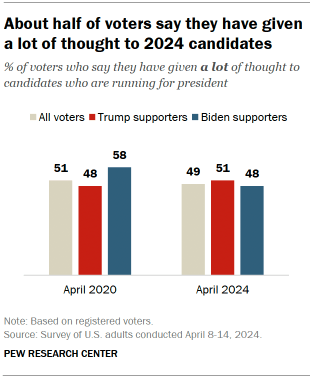
- About half of voters (49%) say they have given a lot of thought to the candidates who are running in the 2024 presidential election – nearly identical to the share saying this at a similar point four years ago (51%).
- But the share who say “it really matters who wins” in November is 5 percentage points lower than it was in April 2020.
- And most voters say, if they it were up to them, they would replace at least one of the two likely nominees (Joe Biden and Donald Trump). About half say they’d replace both Biden and Trump on the ballot.
Attention to the candidates
Today, Trump and Biden supporters are about equally likely to say they’ve given a lot of thought to the presidential candidates. About half of Trump’s and Biden’s supporters say they have given a lot of thought to their options.
In April 2020, about half of voters said they had given “a lot” of thought to the candidates. But Biden’s supporters – fresh off the heels of a competitive primary – were more likely than Trump’s supporters to say they had thought a lot about the candidates (58% vs. 48%).
Does it matter who wins?
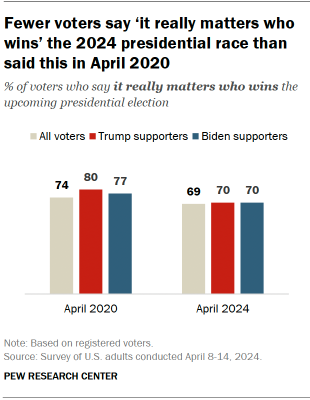
Today, 69% of voters say “it really matters who wins” the presidential election. Just 8% say it doesn’t really matter who wins, and roughly a third fall somewhere in between.
However, the share of voters who say it really matters is 5 points lower than it was in April 2020, when 74% of voters said it really mattered. Both Trump and Biden supporters are lower on this measure today than four years ago.
What if voters could change the presidential ballot?
Though both Biden and Trump have received enough delegates in the 2024 presidential primaries to secure their respective party’s nominations for president, most voters say they would like to replace at least one of them on the ballot.
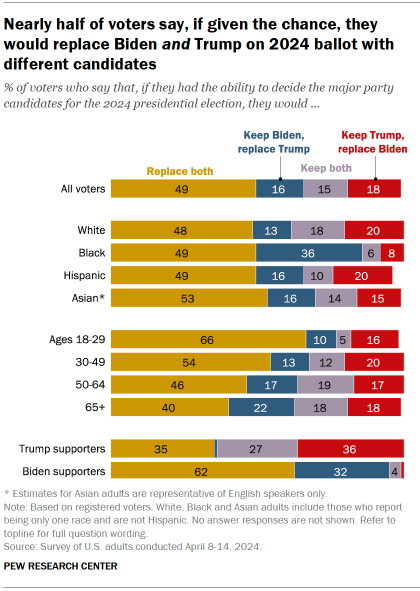
- 49% of voters say that, if they had the ability to decide the major party candidates for the 2024 presidential election, they would replace both Trump and Biden with different candidates.
- 16% say they would keep Biden but replace Trump with a different Republican.
- A similar share (18%) say they would keep Trump but replace Biden with a different Democrat.
- Another 15% of voters say they would keep the contest as is.
Demographic and political differences
There are demographic differences in desired changes to the ballot. To some extent, these are associated with voting preferences.
Biden supporters are much more likely than Trump supporters to say they’d replace both candidates if they could (62% of Biden’s supporters say this, compared with 35% of Trump’s). In contrast, Trump’s voters are much more likely than Biden’s to say they’d keep both(27% of Trump supporters vs. 4% of Biden supporters). Roughly similar shares (about a third each) of each candidate’s supporters say they would keep only their candidate and replace the other.
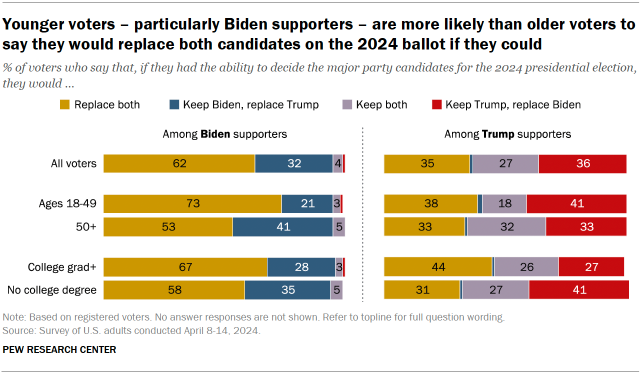
Age
Younger voters are more likely than older voters to desire ballot changes. Roughly two-thirds of voters under 30 say they would replace both Biden and Trump on the 2024 ballot. This compares with a narrower majority of those ages 30 to 49 (54%) and smaller shares of those 50 to 64 (46%) and those 65 and older (40%).
The gap between younger and older voters is far wider among Biden’s backers:
- Nearly three-quarters of Biden supporters under 50 (73%) say they would replace both candidates. Among Biden supporters ages 50 and older, about half say they would replace both Biden and Trump (53%). In both age groups, most of those who do not want to replace both candidates say they would keep only Biden.
- Among Trump supporters, 38% of those under 50 would replace both, compared with 33% of those 50 and older. Older Trump supporters are roughly twice as likely as younger Trump supporters to say they’d keep both candidates on the ballot (32% vs. 18%). Older Trump backers are more likely than younger ones to say they’d keep Trump but replace Biden (41% vs. 33%).
Education
Among each candidate’s supporters, those with a four-year college degree are more likely than those with less education to say they would replace both candidates if they could.
How important is it for the losing candidate to publicly acknowledge the winner?
Most voters continue to say it is at least somewhat important for the losing candidate to publicly acknowledge the winner as the legitimate president of the country.
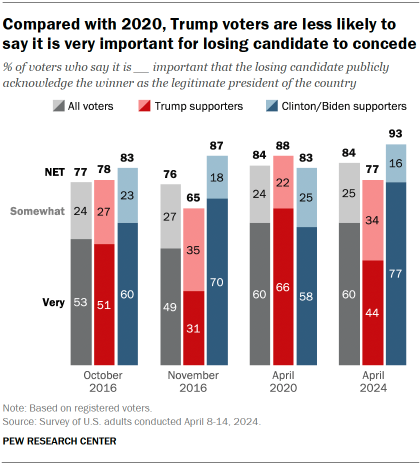
Over the past eight years, a majority of voters – regardless of who they supported for president – have said it was at least somewhat important that the losing candidate in a presidential race acknowledge the winner.
But the degree to which Trump’s supporters have said this is important has shifted over the past eight years.
As the 2016 presidential election neared, Trump’s supporters became less likely to say it was important for the losing candidate to concede than they were earlier in the fall: The share who said it was very important for the loser to acknowledge the winner as the legitimate president declined by 20 percentage points between October 2016 and the eve of the November 2016 election.
In the spring of 2020, as Trump ran for reelection, 66% said this was very important.
Today, 44% of Trump’s supporters say it is very important for the losing candidate to concede. This compares with 77% of Biden’s supporters.
While there have been shifts among Clinton and Biden supporters during the same period, these changes have been much more modest. Majorities have said it is very important for the losing candidate to acknowledge the winner.




